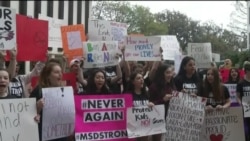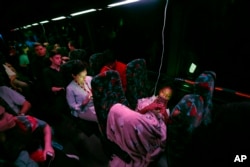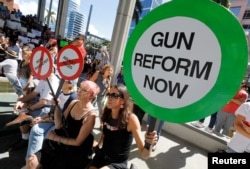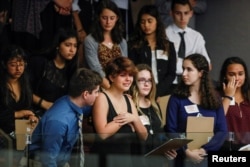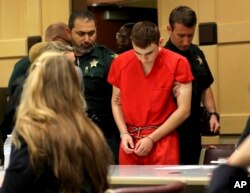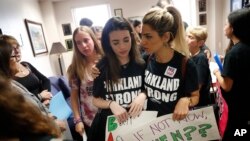Hundreds of students from Marjory Stoneman Douglas High School in Parkland, Florida rallied at the Florida Capitol in Tallahassee Wednesday to pressure lawmakers to approve tougher gun control laws one week after one of the most deadly U.S. school shootings.
A gunman killed 17 people at the Parkland school, triggering a wave of protests by students in Tallahassee and elsewhere in the U.S. Teachers and Florida state representative Sean Shaw joined the students on the grounds of the capitol.
"We had a chance to do something and we didn't," the Democratic lawmaker said of a party line house vote not to consider a bill that called for a ban on assault weapons. "That's why you're up here. Go and demand action. You're not up to ask. This is about you. This is not about us."
The mass shooting has also sparked a wave of rallies elsewhere in Florida and in other states in an attempt force local and national leaders take action to prevent such attacks.
Mothers from across Georgia converged on the state capitol of Atlanta Wednesday to attended a Moms Demand Action advocacy group rally. The rally's purpose is to advocate for responsible gun ownership and not ban guns.
More than 200 students at Montgomery Blair High School in the Washington suburb of Silver Spring, Maryland walked out of school Wednesday to attend a planned protest for gun control at the U.S. Capitol. Protest organizers said student from two other suburban Maryland high schools, Richard Montgomery and Bethesda-Chevy Chase, are also participating in the demonstration.
The Stoneman Douglas students began taking buses over the past couple of days to Tallahassee to take part in Wednesday's rally and to meet with legislative leaders.
"We (students) are the ones most involved in this," student Ariana Ortega told VOA before boarding one of the buses. "We are the ones who lived through this whole tragic experience, and we are going to be the future leaders of America."
Students were in the gallery of the Florida House on Tuesday as lawmakers rejected a Democratic proposal to consider a bill to ban assault rifles. Republicans accused the Democrats of forcing the issue after 19-year-old Nikolas Cruz allegedly used an AR-15 to carry out the Stoneman Douglas shooting.
Lizzie Eaton, a junior at Stoneman Douglas, called the legislature's vote "heartbreaking." But she said: "We're not going to stop. We're going to keep fighting for what we believe in. We're not going to let this bring us down."
In addition to Wednesday's rally in Tallahassee, President Donald Trump will host parents, teachers, and students for what the White House calls a "listening session" on school safety. Survivors from the Parkland, Sandy Hook, and Columbine school massacres have been invited.
Students are also planning a March 24 rally in Washington and other major cities called "March for Our Lives."
Music stars Justin Bieber, Lady Gaga and Cher have thrown their support behind the march. Actor George Clooney and his wife, Amal, a human rights attorney, said they are donating $500,000 to help pay for it, and media mogul Oprah Winfrey said she would match their contribution.
"Our family will be there on March 24 to stand side by side with this incredible generation of young people from all over the country," Clooney said.
Meanwhile, White House spokeswoman Sarah Huckabee Sanders on Tuesday tried to smooth over the fallout from Trump's controversial tweet about the FBI in which he said agents missed signs about the Parkland shooter because it was busy trying to look for election interference collusion between his campaign and Russia.
Sanders said a "deranged individual" was the cause of the killings.
The FBI admitted it did not act on a tip on January 5 about Cruz when someone with a close relationship to him called with information about his "gun ownership, desire to kill people, erratic behavior and disturbing social media posts, as well as the potential of him conducting a school shooting."
A Washington Post-ABC News poll released Monday said 86 percent of respondents who identified themselves as Democrats said stricter gun control laws could have prevented the Florida shooting, while 67 percent of Republicans said stricter laws could not have prevented the massacre.
More than three-quarters of both groups, however, said more effective mental health screening and treatment could have prevented the attack.
Overall, 77 percent of respondents said Congress is not doing enough to prevent mass shootings in the United States, while 62 percent said Trump was not doing enough.
Police say shooting suspect Nikolas Cruz confessed to gunning down 14 students and three adults at the high school he was expelled from last year. He was able to buy an AR-15 rifle to carry out the mayhem after clearing a background check.
In Washington, Democratic lawmakers often call for tighter controls on gun purchases, while Republicans often oppose them, saying they would violate the Second Amendment to the U.S. Constitution sanctioning gun ownership.
The background check measures would not impose new restrictions on gun purchases, but rather attempt to make sure information about mental health and criminal conviction records that legally bar individuals from buying weapons is consistently sent to the National Instant Criminal Background Check System.
U.S. authorities have frequently learned in the aftermath of a shooting rampage that the shooter should not have been allowed to buy a weapon because of mental health issues or a criminal conviction, but the information was never forwarded to the national database.
In Photos: Tallahassee Student Rally




